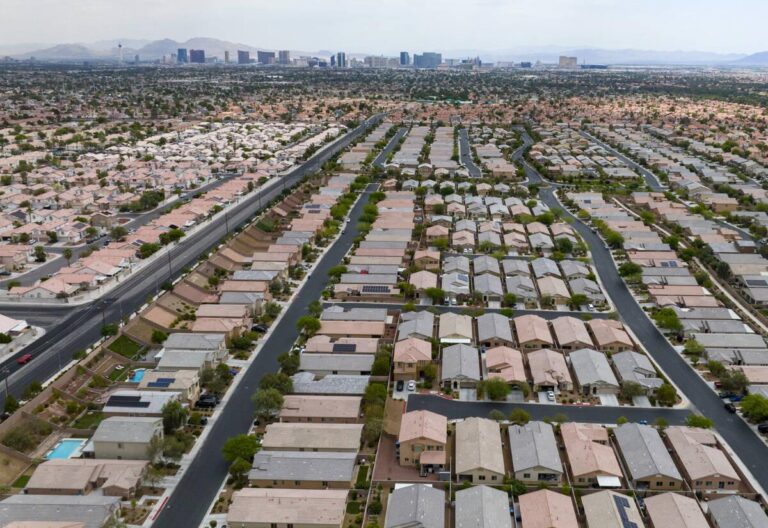Las Vegas Housing Affordability Worsens as Home Prices Surge
Recent data indicates that homebuyers in Las Vegas are encountering escalating financial challenges due to a sharp increase in median home prices that far exceed wage growth.This rapid appreciation in property values has caused affordability in the city to fall below the national benchmark, forcing residents to dedicate a larger share of their income to housing expenses. Such dynamics threaten economic mobility and the overall stability of local communities.
Several key elements are driving this affordability squeeze:
- Scarcity of available homes intensifying buyer competition
- Population influx and migration boosting housing demand
- Elevated mortgage interest rates reducing purchasing power
- Escalating construction expenses inflating new home prices
| Metric | Las Vegas | National Average |
|---|---|---|
| Median Home Price | $460,000 | $410,000 |
| Median Household Income | $60,000 | $68,000 |
| Price-to-Income Ratio | 7.7 | 6.0 |
| 30-Year Fixed Mortgage Rate | 6.8% | 6.5% |
Consequences of Escalating Housing Costs for Residents and Prospective Buyers
The upward trajectory of housing expenses in Las Vegas is placing significant strain on both existing residents and those aiming to enter the market. Many households are grappling with stagnant wages that fail to keep pace with soaring home prices, resulting in increased rent burdens. This financial pressure limits families’ ability to save, invest in education, or cover healthcare costs, thereby diminishing overall living standards.
For potential homeowners, the market presents formidable obstacles, including:
- Growing down payment requirements aligned with rising property values
- Increased mortgage interest rates leading to heftier monthly payments
- Investor competition reducing the pool of available homes for owner-occupants
| Challenge | Impact on Buyers | Impact on Residents |
|---|---|---|
| Price Inflation | Lowered affordability | Higher rental costs |
| Housing Shortage | Increased competition | Limited relocation options |
| Mortgage Rate Hikes | Elevated monthly payments | Challenges in building home equity |
Root Causes Behind the Housing Market Strain in Las Vegas
Las Vegas is currently facing intense pressure in its housing market, driven by a combination of surging demand and constrained supply. The city’s appeal as a relocation hub-thanks to favorable tax policies and expanding job opportunities-has intensified buyer competition, pushing prices upward. However, new construction has lagged due to labor shortages, rising material costs, and regulatory challenges, creating a supply-demand imbalance that exacerbates affordability issues.
Primary factors contributing to this market tension include:
- Population growth exceeding the pace of new housing developments
- Increased costs of building materials and labor
- Investor purchases limiting homes available for residents
- Volatile mortgage interest rates affecting buyer capacity
- Restrictive zoning laws limiting high-density housing options
| Factor | Current Impact |
|---|---|
| Annual Population Growth | Approximately 4.5% |
| New Housing Starts | Declined by 12% year-over-year |
| Home Price Increase (Past Year) | Up 15% |
| Mortgage Interest Rates | Fluctuating between 6% and 7% |
Policy Solutions and Strategic Approaches to Ease the Affordability Crisis
Mitigating Las Vegas’s growing housing affordability challenges demands a comprehensive strategy that combines innovative policies with community engagement. Expanding inclusionary zoning policies to mandate affordable units in new developments is a critical step. Additionally, boosting support for rental assistance programs and first-time homebuyer grants can provide immediate relief to financially vulnerable groups. Collaborative efforts between municipal authorities and private developers to promote mixed-income housing projects have proven effective in comparable urban areas.
Additional targeted initiatives include:
- Property tax exemptions or reductions for low-income homeowners
- Streamlining building permits to lower development costs and accelerate construction
- Investing in transit-oriented developments to reduce overall living expenses by improving access to public transportation
- Supporting community land trusts to preserve long-term housing affordability
The following table outlines key policy instruments alongside their intended goals:
| Policy Instrument | Objective |
|---|---|
| Inclusionary Zoning | Guarantee affordable housing units in new projects |
| Rental Assistance | Alleviate rent burdens for low-income households |
| Tax Relief | Shield existing homeowners from escalating costs |
| Transit-Oriented Development | Reduce living expenses through enhanced transit access |
Looking Ahead: Navigating Las Vegas’s Housing Affordability Landscape
As Las Vegas continues to draw new residents and businesses, the challenge of maintaining affordable housing options remains a pressing concern. The latest findings, which show that housing costs in the city surpass national averages, underscore the necessity for coordinated action among policymakers, developers, and community leaders. Addressing supply shortages and implementing effective affordability measures will be vital to ensuring that growth does not come at the expense of accessible housing for all income brackets. Ongoing monitoring and adaptive strategies will play a crucial role in balancing expansion with sustainable affordability in this dynamic market.




